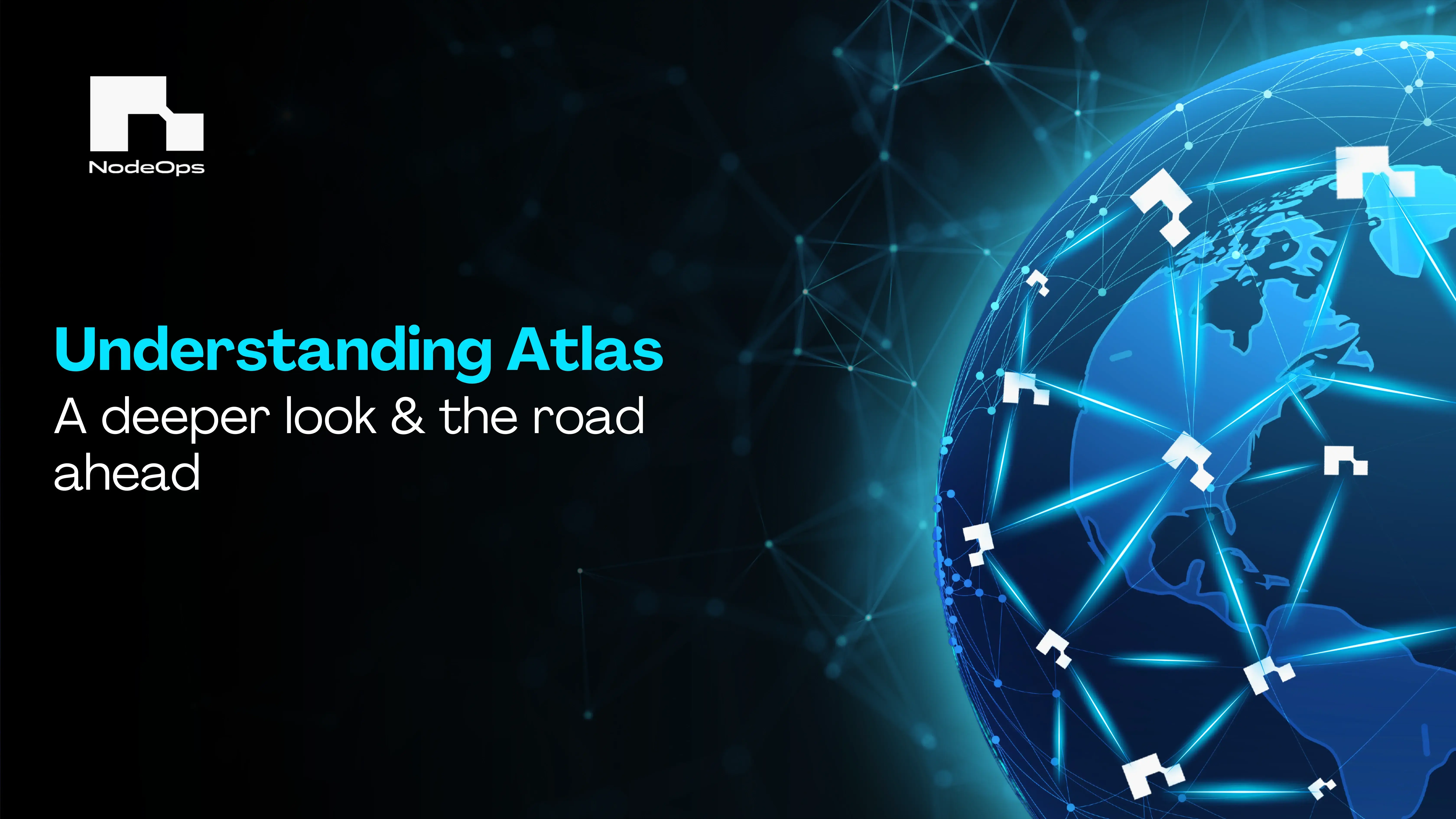At NodeOps, we are not just interested in node networks; we are experts in them.
We have a proven track record of helping Web3 projects bootstrap their node networks. This past week, we successfully onboarded and created thousands of nodes for four projects.
Web3 projects and protocols rely on this network of nodes to provide their services in an open, trustless, and decentralized fashion, but are these networks truly decentralized?
In this blog, we peel back some layers to provide a picture of what we are building with our orchestration layer, Atlas.
Building Atlas: The Future of Node Orchestration
At NodeOps, this question has practical implications, especially regarding censorship resistance and government regulations. However, it cannot be a binary yes or no; every project lies at a different point within a spectrum of decentralization.
So, now the question arises: how can a project improve its decentralization?
Since we are somewhat of an expert at establishing node networks, from this same perspective, we feel that decentralization at the node network level can be improved by:
Enabling a more diverse pool of the type of infrastructure that runs these nodes
Enabling an additional layer of economic security to the nodes that run on this infrastructure
And keep those contributing to this network of infrastructure and economic security providers incentivized to remain active and honest.
From this came forth the idea of Atlas. We call Atlas a DePIN orchestration layer for node networks, but there is much more under the hood.
Atlas: NodeOps’ DePIN orchestration layer
Key Stakeholders in the Atlas Network
Let's start with the different stakeholders involved within the Atlas Network.
Web3 Projects
These are projects that build a decentralized application or infrastructure and require bootstrapping a network of nodes running their node software. As a Node-as-a-Service platform, we have created the infrastructure and deployed almost 46,000 nodes for more than 45 projects in different verticals like Gaming, AI, DePIN, and others.
Infrastructure Providers
Let's discuss the infrastructure where these nodes get deployed. The infrastructure often lies on centralized cloud providers, many of which exist. Hence, a network could be fairly decentralized depending on the NaaS platform.
With NodeOps, these nodes get deployed across seven different cloud providers, but we strive for diversity as it will enable true decentralization at the node infrastructure level.
With Atlas, we want to bring in different infrastructure providers. These include solo validators or infrastructure providers, groups or entities that run validators for other blockchains, decentralized compute providers, restaking operators, and others into one massive pool of infrastructure.
Such a diverse pool will drastically improve the decentralization of any node network, but it also raises the question about security and reliability.
Restaking Operators
Restaking Operators from leading staking protocols like EigenLayer, Babylon, Karak, and others constitute this category of stakeholders.
These operators bring two things to Atlas:
First, they bring off-chain verifiability on-chain. This simply means that certain tasks performed by Atlas will be delegated to these Operators, who, in turn, will record the results on-chain on Ethereum.
Second, they bring crypto-economic security.
Crypto-economic security will depend on the stake these Operators bring to the Atlas Network and will be subject to slashing if found to be engaged in malpractice. For a Web3 project deploying its nodes to Atlas’ provider pool, these Operators ensure that critical functions for deployment run smoothly, bringing in an element of reliability. Since Operators are rewarded with NodePoints for their honest contribution, they are incentivized to continue working for Atlas.
Apart from this, having a record of transactions on Ethereum's ledger not only brings an element of openness to Atlas but also instills trust in the node networks it supports.
NodeWatch Network
The last stakeholder is the NodeWatch Network. The NodeWatch network is a collection of light clients that work to monitor the overall quality of service of the Atlas Network. This network of clients brings yet another level of reliability to the node networks.
Anyone can become a Node Watcher. Individuals running the NodeWatch software will get rewarded for providing their hardware resources to secure the Atlas Network.
Now that we understand the different entities that makeup Atlas, let's switch our focus to see what Atlas does with them.
Orchestration within Atlas
To understand how Atlas works, we need to imagine a unified marketplace where all these stakeholders could transact. In such a marketplace:
Web3 projects could bootstrap their node network seamlessly using the pioneering Node Bootstrapping deployment mechanism by NodeOps.
Providers can onboard themselves and their collection of machines into the pool of existing infrastructure providers and get rewarded in return.
Restaking Operators can onboard themselves, bringing with them security in the form of restaked ETH, BTC, or SOL and getting rewarded for the validation tasks they perform.
Individuals could download and run the NodeWatch client software to actively monitor the state of the provider pool and the nodes running on it.
All these tasks need coordination between the different stakeholders, and this is where the orchestration element comes into play. To enable this, Atlas needs to be able to perform different functions, such as:
Onboarding
Onboarding contains the set of tasks required for getting new Web3 projects interested in bootstrapping a node network, compute Providers looking to use or reuse their compute infrastructure, and restaking Operators willing to provide additional economic security to these node networks.
Scheduling and Deployment
This refers to finding the optimal machine for a node and performing the deployment. Atlas will have logic to select a machine from the pool for every node deployment based on certain parameters, such as CPU, RAM, and disk space.
Monitoring
Every provider's machine will be constantly monitored for its uptime, CPU, memory, and disk utilization. In addition, the state of each machine with respect to its hardware configuration will also be monitored to ensure any changes are captured.
Incentivization and Slashing
The tasks in this category pertain to rewarding the honest behavior of the stakeholders, punishing any misadventure attempt, and ensuring a sustainable economy. Atlas is working on including a dual incentive model with rewards in USDC as well as NodePoints.
Ever since the release of our litepaper outlining the vision with Atlas, we have created the basic building blocks to prove the concept behind Atlas. Recently, we started a private testnet called Alphanet to test out what we have created so far, and we were pleasantly surprised by how Altas performed.
A lot more is being built, such as separating Operators and Providers along with the improved scheduling logic. We are also creating a staking and vesting module, reworking the rewards mechanism, and making several engineering additions and improvements to the overall architecture. These details will be shared subsequently.
Stay in touch with our developments as we get closer to creating the first unified marketplace for decentralized, secure, and reliable node infrastructure for all of Web3.
About NodeOps
NodeOps is the leading infrastructure marketplace for Web3, allowing anyone to purchase, deploy and manage a wide range of blockchain nodes. Our mission is to truly decentralize Web3. One node at a time. To achieve this, we are streamlining the entire node orchestration process and offer an easy-to-use platform for Web3 protocols, developers and retail users to manage all their operational needs. With Atlas—our permissionless, decentralized infrastructure orchestration layer built as an AVS on EigenLayer—we're setting new standards in ease, speed, and security for infrastructure management. We support over 45 chains, created 28,800+ NodeFolios, deployed 45,900+ nodes, and manage assets worth $58.2 million .
Join NodeOps today and deploy your first node at nodeops.xyz, or follow us on X for the latest news & updates.

